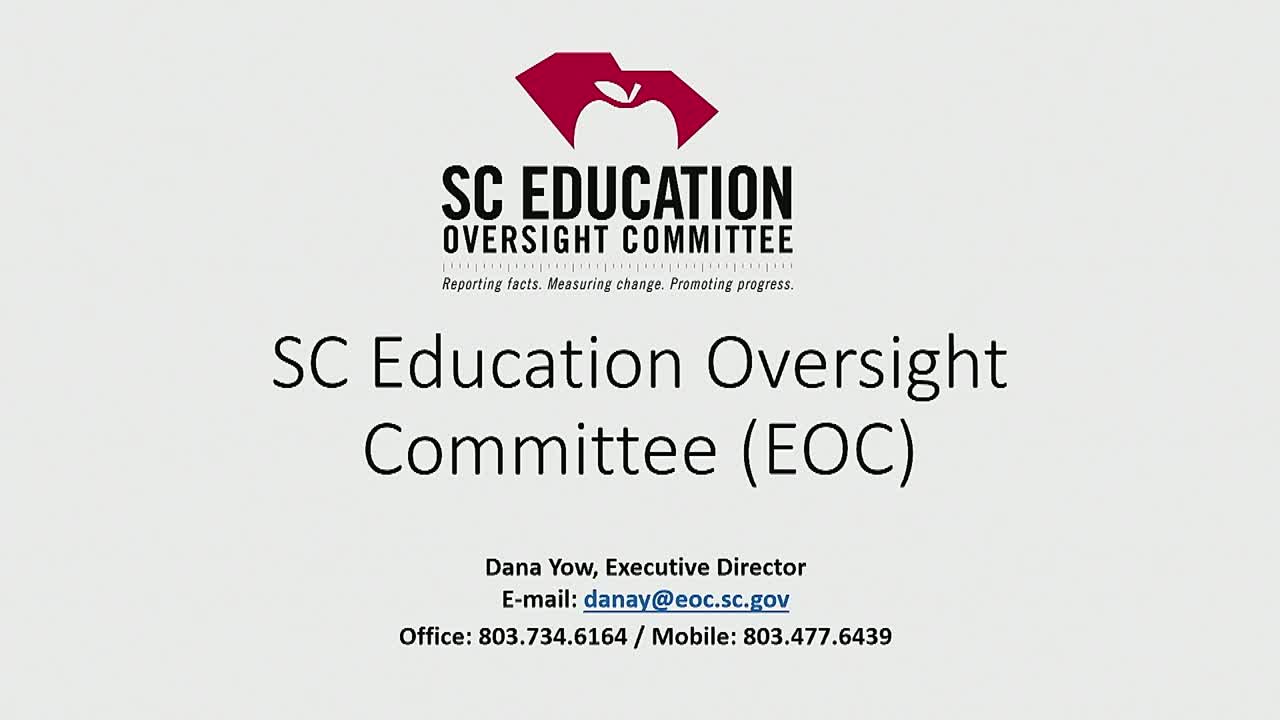Education Oversight Committee presents data dashboard, flags absenteeism and rural teacher shortages
Get AI-powered insights, summaries, and transcripts
Subscribe
Summary
The Education Oversight Committee reviewed its role, data tools and evaluations, telling the House Education and Public Works Committee that the statewide dashboard and recent studies show progress on graduation rates but persistent gaps in college- and career-readiness, chronic absenteeism and rural teacher recruitment.
Dana Yao, executive director of the Education Oversight Committee, told members of the House Education and Public Works Committee on an education panel that the EOC oversees academic standards, statewide assessments and the accountability system used to produce school report cards.
The EOC’s work, Yao said, includes approving content standards and statewide assessments for English language arts, math, science and social studies; producing annual report cards required by law; and evaluating state-funded education programs such as the full-day 4-K program and the Educational Credit for Exceptional Needs. "We approve the content standards and the statewide assessments for the big 4," Yao said during her presentation.
Yao emphasized the committee’s new public dashboards (dashboardsc.sc.gov) that visualize district- and school-level spending and outcomes. She told the panel the EOC’s 2024 data show an on-time graduation rate of 85.4 percent and that the dashboards are used to track college- and career-readiness and other outcomes. The EOC also reports annually on teacher loan programs and military-connected students.
The presentation highlighted several current EOC projects: annual evaluations of the full-day 4‑K program (which the EOC said the available evaluations show benefit four-year-olds), an evaluation of a rural recruitment initiative funded with about $7.6 million in EIA (Education Improvement Act) funds, and an analysis of alternative modes of instruction (face-to-face, online, hybrid). Yao said the EOC’s review of modes of instruction found face-to-face delivery more effective for student achievement in the most recent year and that the committee expects to repeat that analysis.
Committee members pressed for context on readiness and attendance. Yao described chronic absenteeism as a major factor in academic outcomes and said the EOC’s dashboard and recent focus groups with students and parents are producing new information for policymakers. The EOC is also preparing a public-awareness approach intended to encourage elementary-parent practices, such as teachers and staff signaling that a returning child was missed, to improve attendance.
Members asked for additional detail on rural teacher turnover and which recruitment incentives produce the best return on investment. Yao said the EOC cataloged about 15 incentive options—examples include housing subsidies, mentoring, recruitment fairs and hiring international teachers—and that the committee is studying which incentives improve recruitment and retention, particularly in the first five years of a teacher’s career. "We were looking at return on investment. So of those incentives, what is actually working to get teachers into the classroom and to retain them," she said.
The committee chair and members requested copies of the slides and the EOC’s recent EIA recommendations; Yao said those materials and the dashboard would be shared.
The presentation closed with a staffing note: the EOC described its office as small (about eight FTEs) and available to provide data or follow-up briefings to lawmakers.
Looking ahead, Yao asked legislators to engage locally with the dashboard and nominated cycles for the accountability system review that the committee will conduct this year.
